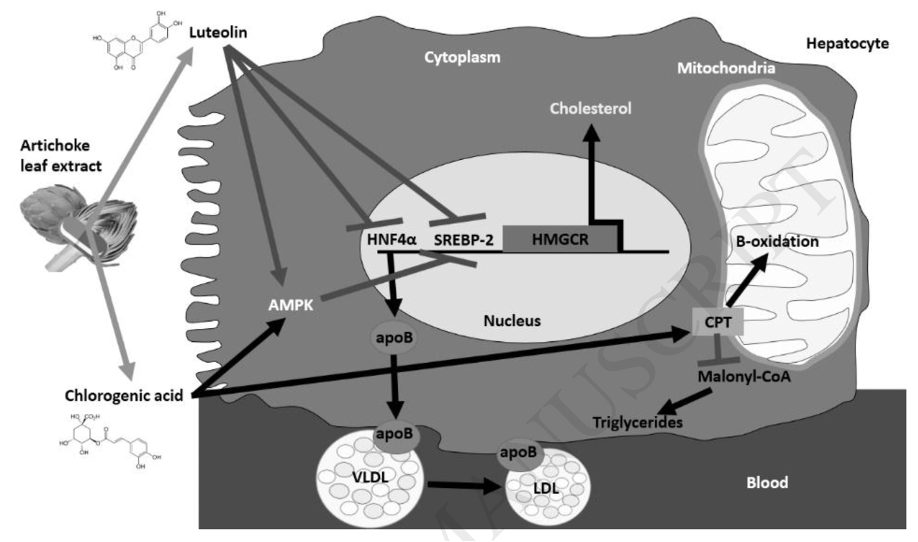Cardiovascular disease is a highly prevalent problem worldwide and one of its main manifestations is dyslipidemia, which needs more attention. Cooked artichoke (Cynara scolymus) hearts or artichoke leaf extract (ALE) is considered to be helpful in the treatment of dyslipidemia.
As shown in the figure below, modulation of lipid profile induced by ALE occurs mainly through the actions of luteolin and chlorogenic acid. In the hepatocyte nucleus, luteolin decreases HNF4α expression, consequently decreasing cholesterol synthesis due to inhibition of SREBP-2 and HMGCR. Reduced HNF4α expression also decreases the synthesis of apoB, consequently decreasing VLDL and LDL levels. Chlorogenic acid decreases cholesterol synthesis due to stimulation of AMPK and consequent inhibition of SREBP-2. Chlorogenic acid may also lower triglyceride levels by CPT stimulation, which increases β-oxidation and inhibits Malonyl-CoA.

Note: apoB: apolipoprotein B; AMPK: AMP-activated protein kinase; CPT: Carnitine Palmitoyl Transferase; HMGCR: 3-Hydroxy-3-Methylglutaryl-CoA Reductase; HNF4α: Hepatocyte nuclear factor 4α; SREBP-2: Sterol-regulatory element-binding protein; VLDL: very low-density lipoprotein.
Researchers studied the effects of supplementation with artichoke extract on lipid profile by meta-analysis and performed dose-response analysis.
Thus, researchers searched Pubmed, Scopus, Web of Science, and the Cochrane Library. Then, two researchers rated the certainty in the estimates using the GRADE approach. Based on the random-effects analysis, combining 15 effect sizes from 14 studies, it was found that artichoke significantly reduced serum triglycerides (TG), total cholesterol (TC), and C type of low-density lipoprotein (LDL-C), but had no significant effect on L type of the high-density lipoprotein (HDL-L) levels. By combining 2 effect sizes, artichoke beverage supplementation was found to significantly reduce TG, TC, and HDL-C levels.
In conclusion, we found that artichoke supplementation may favor cardiovascular disease prevention by acting in improving the lipid profile.
Santos, H. O., Bueno, A. A., & Mota, J. F. (2018). The effect of artichoke on lipid profile: A review of possible mechanisms of action. Pharmacological research, 137, 170–178. https://doi.org/10.1016/j.phrs.2018.10.007 [Link]
